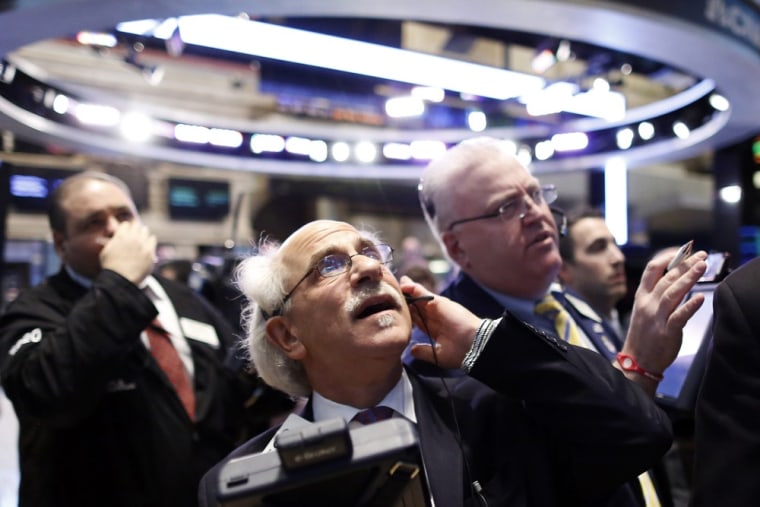
Stocks ended near session highs in choppy trading, with the S&P 500 finishing in positive territory for the first Monday in 2013 and the Dow close to hitting its record closing high, as investors shook off earlier worries over China and a lack of progress over the sequester.
"It's been a slow-growth market and it's going to continue—if volume picks up, it picks up, but you're not going to see any euphoria in the market for a long time," said Neil Hennessy, CIO and portfolio manager at Hennessy Funds.
The Dow Jones Industrial Average ended in positive territory, led by Wal-Mart and Home Depot. The blue-chip index is now within 50 points of its all-time closing high of 14,164.53 hit on Oct. 9, 2007.
The S&P 500 and the Nasdaq also finished higher. The S&P logged its first positive Monday in 2013. The CBOE Volatility Index (VIX), widely considered the best gauge of fear in the market, fell below 15.
"The S&P 500 is currently fewer than 50 points away from its all-time closing high of 1,565, [but] if history is any guide...the S&P 500 may have little time to rejoice following the setting of a new record high before collapsing once again, as the median advance following the recovery to break even from bear markets since World War II has only been three percent before stumbling and falling into another meaningful decline within only two months," wrote Sam Stovall, chief equity Strategist at S&P Capital IQ.
Among the key S&P sectors, utilities ended higher, while energy finished in the red.
The $85 billion spending cuts officially started taking effect over the weekend. While stocks so far have largely ignored the concerns over the sequester, analysts say signs the cuts are beginning to impact the economy could eventually move markets.
Over the weekend, House Speaker John Boehner said he and President Barack Obama had made no headway on a deal to avoid automatic budget cuts. Meanwhile, House Republicans are expected to introduce a bill to extend government funding through September, to avoid a government shutdown at the end of the month.
There are no major economic or earnings reports scheduled for release.
The Shanghai Composite tumbled to its lowest level in six weeks after the Chinese cabinet announced an increase in down payments and loan rates for buyers of second homes in cities where prices are rising too quickly.
Read More: China Property Curbs in Focus Ahead of Parliament Meet
The basic resources sector, which has heavy exposure to China, traded sharply following the news. Anglo American, Kazakhmys, BHP Billiton and Rio Tinto tumbled.
"Chinese tightening of monetary policy amid soaring property prices is the first test of investor resolve to push equity markets on to higher ground this week," wrote Mike McCudden, head of derivatives at stockbroker Interactive Investor.
Apple slid to hit a fresh 52-week low after the iPhone maker faced a major setback in its ongoing mobile patents battle with rival Samsung Electronics last Friday, as a federal judge slashed a $1.05 billion jury award by more than 40 percent and set a new trial to determine damages.
Read More: What Apple Must Do to Catch Samsung: Analyst
Meanwhile, Google hit a new 52-week high. Google is up nearly 15 percent year-to-date, while Apple has tumbled almost 20 percent.
Yahoo edged higher after the Internet company said it plans to discontinue seven of its products, including its mobile BlackBerry app. Separately, Barclays upgraded its rating on the company to "overweight" from "equal weight," saying Yahoo's stakes in Alibaba and Yahoo Japan are undervalued.
Best Buy rose after Janney Capital and Bernstein raised its fair value on the electronics retailer to $21 from $18 and Bernstein increased its price target to $16 from $12.
Hess jumped to lead the S&P 500 gainers after the oil and gas company said it will exit its retail, energy market and energy trading businesses amid pressure to break up the company from its third-largest shareholder Elliott Management. In addition, the company said it plans to repurchase up to $4 billion of its stock and raise its annual dividend to $1 from 40 cents.
Celgene said its experimental psoriasis drug was found to be safe and effective in a trial, paving the way for a filing for regulatory approval during the second half of 2013. But shares declined.
In Europe, the banking sector was under pressure after worse-than-expected results from HSBC, the region's biggest bank. HSBC CEO Stuart Gulliver said the bank had faced a challenging operating environment in 2012, with low economic growth and changing regulations.
Japan was an exception to the negative trend, with the Nikkei reaching a four-and-a-half-year peak after Haruhiko Kuroda, the government's nominee for the post of Bank of Japan Governor, testified in favor of further aggressive monetary stimulus.
Later in the week, investors will focus on February's official jobs numbers, out on Friday.
"With a full economic agenda lying in wait, culminating in the big U.S. employment number on Friday, investors should strap themselves in for a bumpy ride. With the deep spending cuts taking effect in the U.S., there has been increasing demand in the options market for 'puts', as investors start to move to the sidelines and take some risk off the table," said McCudden.